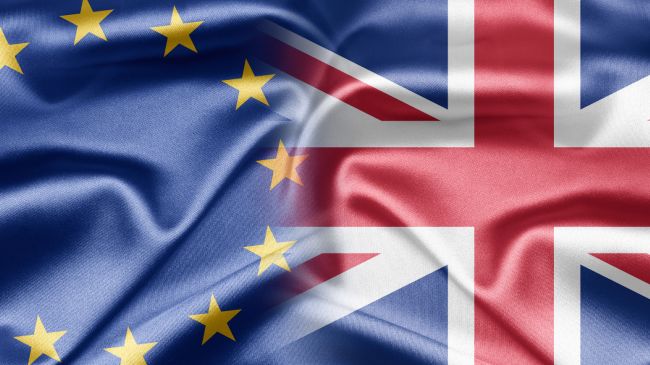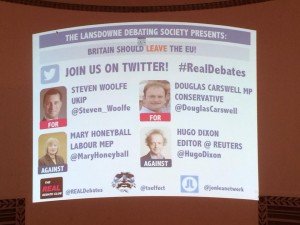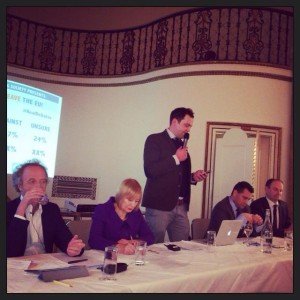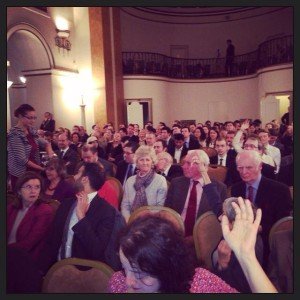
Should Britain leave the EU?
On Wednesday 13 November 2013, the Real Debate Club, supported by the Jonathan Lea Network and The Tom Sawyer Effect brought together an exciting panel to debate the motion that ‘Britain should leave the EU!’. The debate was held in the Ballroom of The Lansdowne Club with an audience of approximately 140.
The speakers were Douglas Carswell (Conservative MP) and Steven Woolfe (UKIP, spokesperson for the City of London) arguing FOR the motion; and Hugo Dixon (Editor of Reuters) and Mary Honeyball (Labour MEP) arguing AGAINST the motion. The debate was chaired by Marcus Warry. To review the live Twitter feed for the debate, see the @jonleanetwork timeline and the #RealDebates hashtag.
The audience vote beforehand read 29% FOR the motion and 47% AGAINST, with 24% UNSURE (although after the event it became clear that, distracted by the need to get to the bar at the start, one or two of the audience members may have mistakenly voted the opposite to what they intended).
Steven Woolfe opened the debate, with an argument rooted in economics and democracy. His stance was that money spent as a result of our EU membership could be spent instead on improving Britain. Steven had not long ago returned from a trip to Poland, where he shed insight on the businesses who said they would continue to trade with Britain post-exit, contrary to the belief that our trade with EU constituent member states would suffer. Steven said that the economics of the EU were ‘frail’ and the rest of Europe has failed financially.
Steven also thought the EU was built to be anti-democratic, because it is an institution which fears ‘you’, the people. He claimed that we cannot vote out any of the people making the decisions in the EU. Indeed, he said that the very idea of the EU – removing the ‘nation state’ – has led to the creation of a ‘corporate state’.
Mary Honeyball was first to respond for the opposition and started by suggesting there are many ‘myths’ often cited by Eurosceptics such as Steven. For example, she said she can be voted out. Mary offered an alternative version of the EU – a ‘coming together of states who deal with issues common to all members’. She also addressed Steven’s argument that the EU is a waste of money, by arguing that we spend approximately the same on railways and transport in this country as we do on the EU.
Mary said that we absolutely cannot leave the EU or the single market. It would too greatly affect our ability to trade, and it would also make Britain less influential on a global political scale. She said that Britain’s ‘role in the world’ requires us to have a ‘seat at the top table’, which the EU duly provides.
Mary did recognise that there was a democratic issue which must be addressed, and indeed the institution is currently debating ways in which it can change. Despite the reservations, she stressed that the EU is run on a democratic basis and there is clear democratic accountability in the institution.
Douglas Carswell responded and said the argument was ‘simple’: it was one of economics. Our EU membership, according to Douglas, means less self-governance and therefore less prosperity. He quipped that the only growing indices in the EU are unemployment and debt! Douglas was of the view that we do still need access to the European market. However this is, in his view, possible if we leave the EU through enacting a free-trade agreement. Douglas put potential exit into context: 20% of Britain’s trade is overseas and just 8% is with the EU. He discounted the idea that we are ‘too small’ to succeed on our own and used the example of Switzerland, who are richer than the EU as a whole.
Hugo Dixon responded to both Steven and Douglas, firstly by separating the euro-crisis from the EU-debate, as importantly, we are not a party to the Euro. Hugo recognises our existing membership as something which is ‘valuable’ – through the EU we can make things better, and the alternatives to the EU are much worse. The value stems from the ‘Four Freedoms’, which he says are one of the ‘most important charters of freedom in world history’: the EU has removed both tariff and non-tariff barriers which prevented trade. The main alternative cited to the EU is the World Trade Organisation, but in Hugo’s opinion, the EU does a far better job regarding the free movement of services.
Hugo stated that trading with Europe or the rest of the world is ‘not an either/or choice’ – if we pull out of the EU we will diminish the extent to which we can trade with our most important trading partner. Any costs cited by the opposition, Hugo believes, are outweighed by the benefits of membership to the single market. Pulling out makes us less attractive for foreign and domestic investment.
Hugo also talked about the opportunity to improve the EU through direct membership. He believes it gives us an opportunity to push the traditional British agenda onto Europe. Rather than discussion and referenda on exiting the EU, Hugo said we should instead concentrate our effort on reforming the EU for the better.
Following each panel members’ opening speech, the debate was opened up to questions from the floor. The first concern was the effect exit would have on the City of London. Douglas said that reservations for the City existed when we didn’t join the Euro, and no such negative effect was ever experienced. He believes exit would make the City more flexible, and allow it to prosper with other areas of the world such as Dubai. Hugo, however, said the EU is the City’s passport: it allows financial services to be offered anywhere in the EU. Hugo cites Swiss banks moving to London so they have the EU access as a prime example of this. Steven believes the laws and regulations passed by the EU (such as Solvency II) are in fact driving businesses out of London.
The audience were keen to hear how the panel think we are comparable to nations such as Switzerland and Hong Kong. Douglas was quick to label the assumptions we make surrounding scale redundant because of the digital age we live in. Being a ‘small’ state would allow us to be innovative and adapt, but ‘in this digital age [the EU’s] giantism is doomed’. An audience member noted that the norm across the world is not to be a member of a union of states, but Hugo stressed that the EU is not like, for example, the Soviet Union and is not a single state. Steven disagreed, saying the EU is not only a state, but it is ‘a state which is trying to control us’.
An audience member stressed to Mary that at the point of the referendum proposed by Cameron in 2017, Britain will have the 6 month Presidency term. Mary dismissed the importance of this, and further stressed that there is a clear movement in the Labour Party who do want a referendum. However, she thought that a referendum is destabilising for business because it leads to great uncertainty over their ability to trade in Europe. Mary was further asked what it was specifically that Britain would lose as a result of an EU exit. She thought that we wouldn’t have such a strong influence on an international level. Mary dismissed Thatcher’s prediction that a European Union would ‘bring socialism in through the back door’, and she asserted that the EU Parliament in fact has a centre-right majority.
The issue of immigration was tackled by the Douglas. He said that for our country to be successful we must attract the brightest and best people. However, EU membership means we allow a large number of poor and unskilled people to settle here. Exiting would mean we could create an immigration policy more favourable to Britain and its economy.
Hugo was questioned on whether the EU can survive at all in light of the Euro crisis. He recognised that the EU and its primary currency are connected and a single currency collapse may have a domino effect. Hugo’s response was that for the EU to survive, rather than increased centralisation, it needs to make itself more competitive.
The panel were pressed on how we should renegotiate our relationship with the EU. Hugo thought that rather than trying to land ‘special deals’, the key is to strengthen our financial services across the EU, because of their contribution to British economy. Douglas thought that the ECJ should not have jurisdiction over Britain. Steven stated that we have fought in this country for the right to vote and this should ultimately mean we frame our own government, for ourselves.
Following the lively debate, the audience were again asked to vote, although were not offered an UNSURE option. The results read 51% FOR the motion, and 49% AGAINST. Of course, where the 24% who votes ‘UNSURE’ would have casted their vote to begin with cannot be known, but nevertheless, the motion was narrowly carried. The debate gave great insight into the pros and cons of EU membership, and it is interactive discussion such as this which is key to the country making an informed decision in the 2017 referendum.



